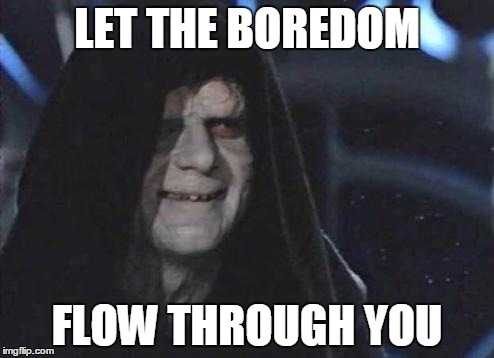Gordon McGladdery runs A Shell In The Pit Audio, a two-person game audio/music company in Vancouver, BC. He also co-hosts the Beards, Cats and Indie Game Audio podcast with Matthew Marteinsson.
“I’ve learned there is a distinct difference between hobbyist/personal inspiration and professional inspiration with deadlines and accountability.
I’ve lived through both and prefer the latter.”
Aspiring and hobbyist artists in any field often plead artistic “block” while waiting for some spark of genius to flit into their skulls and inject the motivation required to begin their opus. My inflated ego at the beginning of my career definitely suffered from this. In the professional world, clients don’t have time to wait on maybe-eventual epiphanies. This so called “block” is an avoidance strategy; a fear of potential rejection, and a fear to step into the void to start work without a carefully-laid-out plan.
I use two primary methods to deal with this:
Noodling.
This is when I have to get something done and nothing’s really standing in my way. Frankly, it’s just “getting to work”. It is embracing the idea of moving forward without a specific goal, but laying ground rules beforehand that will assist in hitting the target.
I’ll assign myself a palette, be it instruments for music, or objects/plugins for SFX. Then, I just start playing semi-random stuff within the assigned framework. I hit record when something interesting is happening, then go back, curate the good from the bad and expand.
Forced boredom.
I think this is just meditation but it sounds less hippy-dippy. I use it from time to time when there is a particular problem that needs to be solved, often for business stuff and technical implementation problems, or when I simply want a new idea. It is a form of noodling in its own right, explained in this John Cleese lecture on creativity.
Our brains demand entertainment in perpetuity. The current generation has been able to provide this via smartphones and constant connectivity. Unfortunately, this unending distraction puts a clamp on original thought. Why do you think all the thinkers of yore were able to get so much revolutionary stuff done? They were aristocrats who didn’t need to work and had nothing to do but let their brains entertain them with original thought when they weren’t out shooting pheasants or courting Mr. Darcy or whatever.
So: ditch the phone, holster your blunderbuss, grab a proper analog pen & paper and go somewhere quiet where no one’s going to bug you for a couple hours. Without distraction your brain will–after it’s done obsessing over high school romantic blunders and taxes–start entertaining itself, sometimes in the form of original ideas. Brain noodling. Write the interesting things down & curate later. It might all suck, you might completely formulate something awesome, or you might plant a seed for something that will become awesome.
This can also be incorporated into daily life in a micro-fashion.
If you need to walk somewhere:
Don’t take your phone.
Don’t listen to music.
Embrace boredom and let your brain just do its thing.

A great tactic I read (by a writer, but it still applies) for getting straight back into your work zone/head space is that when you are nearing the end of a days work, purposefully leave a ‘rough edge’ ie something that is obviously wrong and needs fixing or more work, but that can be done relatively easily.
This way when you start work the next morning, you can dive straight into a task that is easy to complete, and by the time you’ve done it you are back in the zone and can dive into more complex or difficult work. Reduces the opportunity for ‘block’ or procrastinating…
Tim–I do this as often as I can, and yeah, works a treat. Great mention.
Whenever I’m having trouble getting rolling, one surefire way to force myself out of it’s to just start dropping library sounds onto the timeline. No consideration for quality, rough attempt at sync–just put something there.
Now, when you roll back, there’s at least the barest shape of a sound in place. But you can’t leave it there; you’ve got to fix it. So you search more, or you pitch it, or you replace the sound.
And then you’ve got to fix that..
On and on. I think it plays to the same thing that makes it easier to pick up on a half-finished sound the following day.
Not always the method I use, because I get better results out of lots of noodling and cutting up later (when time allows for palette creation), but useful in a pinch.